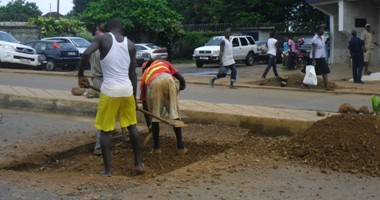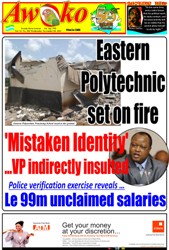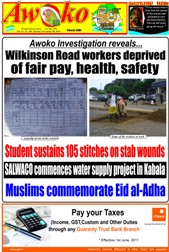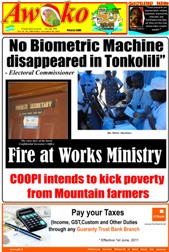 An
Awoko investigation has revealed that labourers building Wilkinson Road are
receiving as little as Le 5,000 per day, despite a collective agreement that
sets the minimum wage at more than Le 8,000 for the lowest-paid construction
workers.
An
Awoko investigation has revealed that labourers building Wilkinson Road are
receiving as little as Le 5,000 per day, despite a collective agreement that
sets the minimum wage at more than Le 8,000 for the lowest-paid construction
workers.
Speaking to about 20 workers employed by China Railway Seventh Group
Co. Ltd. (CRSG) between Congo Cross and Lumley, they presented payroll forms
that showed daily pay of between Le 5,000 and Le 7,000.
However, a minimum
wage set in a collective agreement for all building and construction workers,
made between industry and workers’ representatives, states that unskilled
workers should receive no less than Le 8,196 or Le 214,000 per month.
The
agreement also sets a minimum standard for workers’ safety and benefits, which
workers say are not being met.
CRSG was awarded a contract from the Sierra
Leone Roads Authority to widen a 5.2-kilometre stretch of Wilkinson Road.
Construction started in July 2010 and was due for completion in July
2011.
Most of the workers Awoko spoke to asked that their names not be
published, for fear they would get fired or face other reprisals.
Some,
however, said they were so frustrated with the situation that they wanted their
names published, regardless of whether it risked their job.
A father of four
working at Murray Town junction said he leaves his house around 5 a.m.,
travelling all the way from Kissy Road to the company’s office in Lumley to
register for that day’s work by 7 a.m.
He disclosed that if he is a few
minutes late, he will be marked as absent and will not receive pay for that
day.
He said he received a sum of Le 5,000 per day and his monthly pay was
sometimes as low as Le 130,000 for a month.
Other workers this reporter spoke
to at the Murray Town junction disclosed that they are not covered by insurance
in case of accident, nor do they receive any money for medical expenses, even
for injuries they get at work. Workers also said they do not receive a travel
allowance.
Mohamed Bangura disclosed they work from 7a.m. till 12 noon. They
have a two-hour lunch break and then work again until 6 p.m for a total of 9
hours but they are marked for 8 hours. Some of the time slips the workers
carried showed hours added for overtime but workers said they don’t always
receive pay for it.
“We are subduing to this because we don’t have any option
and the government is not advocating on our behalf,” said Bangura. “When we
protested once in January the leader of that protest was sacked and (the
government) told us that if we are not satisfied we should leave the
job.”
But workers said they have no choice because there are no other
jobs.
Most of the workers at the site were seen wearing flip-flop ‘comfort’
slippers with either a short or long pair of jean trousers to match, using
pick-axes to dig a hole through the pavement. Workers operating and working
around heavy machinery said they received no formal training.
Workers said
they are held liable for damage to cars passing from stone chips and have to pay
the car owner for repairs.
Other workers interviewed along the Wilkinson Road
near Collegiate School also explained about the frustration they get at the
job.
Anthony Garber said they are angry about the treatment meted on them by
the company “but what ever happens we have to manage because this is where our
family depends.”
Garber said CRSG deducts Le 5,000 per month for union dues.
He also said NASSIT is deducted from their pay, but they receive no NASSIT
slips.
“We don’t even know who the union is and no slip is given to us that
we have paid for this or that,” said Garber.
Awoko cross-checked with at
least a dozen workers and none knew who their union is or had received a NASSIT
slip.
Abdul Turay also explained that they are asked to pay for working gear
such as rain boots and coats, and reflective vests. He said a reflective vest
cost Le 50,000 from CRSG.
He said, “All of this is the fault of the
government, when we protested the government told us to work and that they will
arrange with the construction workers but the situation still remains the
same.”
Hassan Kamara explained that during working hours they are not allowed
to eat any food. “They do not even give us water not to talk about food when we
are working, God forbid if you are caught eating while working you will be
marked absent even if you work from morning to night.”
Kamara said workers
who are hurt on the job are sent home and must pay for any medical treatment
themselves. Any time absent from work due to injury is deducted from salaries,
he said.
One worker was killed on the job earlier this year; his family
received just Le 1.5 million in compensation, Kamara said.
A driver at
Wilkinson Road explained to this reporter he is a skilled worker but he only
earns Le 8,000 daily.
He said workers hand in their time slips at the end of
the month and receive their pay, with no record of the amount paid, hours worked
or union and NASSIT dues given to them.
Tejan A. Kassim, Secretary-General of
the Artisan’s Public Works and Services Employees Union that represents the
workers, said the Union has been having problems with CRSG. He has written to
the company on several occasions raising concerns about wages and conditions for
workers but the issues have not been resolved.
Some of the Union’s concerns
included whether medical treatment or first-aid kits were available on-site,
what information is included on payroll slips and whether protective clothing
was provided for workers.
The agreement includes provisions for medical care,
payment, overtime and protective clothing, among other things.
In a response
dated January 16, 2011, CRSG said workers’ salaries were shown clearly on
payroll, first aid kits are available and the company will send someone
seriously injured to hospital.
“About protective clothing, we are confident
that no other companies can do it better than us in Sierra Leone,” it
read.
Kassim said he is trying to meet with the company this weekend to
resolve some of the issues.
The Acting Commissioner of Labour Ahmed Musa said
he is not aware of any anomalies going on at the different sites. If his
department has reason to believe there may be violations taking place, labour
inspectors go to investigate, he said.
Mr. Musa said they haven’t inspected
CRSG but they have gone to other companies.
The problem he said is that they
used to have only two inspectors and it is only recently that five more
inspectors were recruited.
He said the provisions of the collective agreement
are legally binding on all companies and therefore it should not be
flouted.
“Anybody who falls short of this, it is the violations of labour
regulations,” said Mr. Musa.
He confirmed that all companies should observe
health and safety regulations and should also provide safety gears for all their
workers without any cost.
The Public Relations Officer of the Sierra Leone
Roads Authority, Mr. Sorie Kanu, told Awoko that Sierra Leonean workers will
sometimes negotiate lower wages because they are desperate for a job. When they
find out they are underpaid, they run to the government for help, he
said.
The PRO said CRSG was the lowest bidder on the contract, which was
worth about Le 84 billion. The work required has expanded but the government is
not going to pay for that, he said, so CRSG has to make do with the little they
have to pay salaries and complete the job.
The widening of Wilkinson Road is
part of the development of the country and workers should take part, said Mr.
Kanu.
A CRSG representative said they would not comment without permission
from their employer, the SLRA. Mr. Kanu told Awoko the permission would need to
come from project director Mrs. Memuna Jalloh, who was unreachable.
By Betty
Milton

"We make every effort to see that our actions
live up to our words and be vigilant with regards to our
behavior."
- Thomas Sankara
- Thomas Sankara



